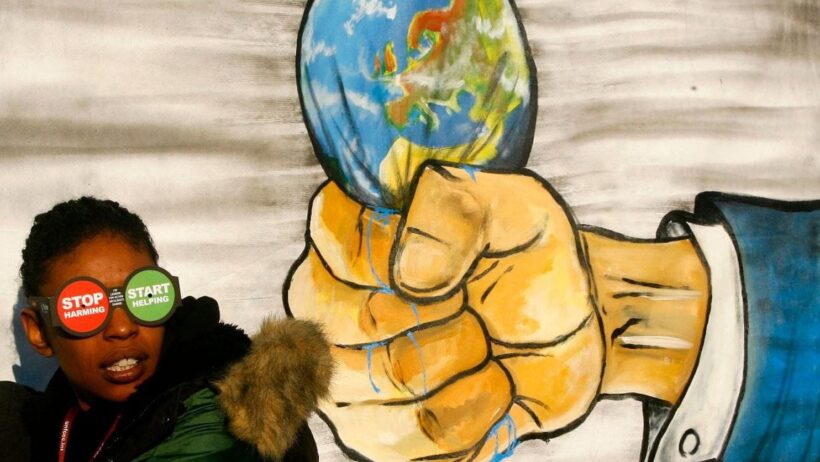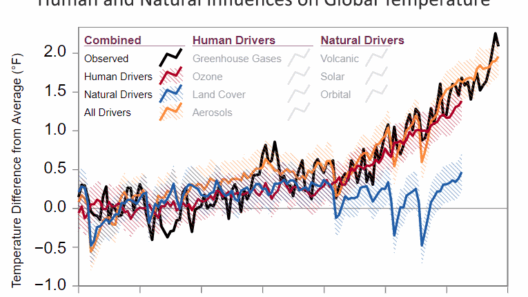Climate change—a term that now reverberates in the chambers of scientific institutions, policy-making bodies, and the consciousness of everyday citizens alike—has emerged as one of the most pressing challenges of our time. It encapsulates multifaceted dilemmas that extend well beyond shifts in temperature or erratic weather patterns; it encompasses our very existence and the tapestry of life on this planet. So, why should we care about climate change? The rationale stretches far and wide, intersecting with ecological preservation, socio-economic stability, and even ethical considerations. Here, we unravel these intricate strands that underscore the significance of this global crisis, revealing the aesthetics of an unspoiled earth and the consequences of its deterioration.
A Fragile Ecosystem: The Dance of Biodiversity
As one traverses the varied vistas of our planet—from the lush rainforests brimming with diverse flora and fauna to the vast, frozen expanses of the Arctic—it’s evident that our ecosystem is a delicate web. Climate change disrupts this intricate ballet of organisms, threatening species extinction at an alarming rate. The dynamics of one species can have cascading effects on others, disrupting food chains and altering habitats irrevocably. The extinction of a single pollinator species, for instance, could precipitate the decline of numerous plant species, thereby affecting entire ecosystems and human food supply.
Dwindling biodiversity degrades ecosystem resilience. A more diverse biological community is better equipped to withstand environmental stressors. Consequently, the loss of biodiversity exacerbates climate change and other environmental stressors, trapping communities in a vicious cycle of degradation. Thus, safeguarding our environment is not merely an act of preservation but a foray into maintaining the very systems that sustain us. The aesthetic appeal of thriving biodiversity reminds us that nature’s beauty is irreplaceable, beckoning us to take action.
Socio-Economic Implications: The Rising Cost of Inaction
The repercussions of climate change extend inexorably into the socio-economic fabric of our lives. As global temperatures rise, the frequency and intensity of natural disasters increase—a phenomenon that has imposing financial repercussions. Floods, wildfires, hurricanes, and droughts are not just extreme weather events; they wreak havoc on communities, destroy homes, disrupt economies, and precipitate mass displacement. The burden falls disproportionately on vulnerable populations, often exacerbating socio-economic inequalities.
Moreover, the costs associated with remediation, rebuilding, and adaptation escalate exponentially as climate change progresses. Investing in “green” technologies and sustainable practices presents a fortuitous opportunity to not just mitigate the crisis but also stimulate economic growth. The burgeoning green economy requires innovation and skilled labor, creating job opportunities across sectors. Transitioning from fossil fuels to renewable energy sources offers the dual boon of environmental stewardship and economic prosperity, making climate change not merely an ecological concern but a critical economic agenda.
Ethical Obligations: The Interconnectedness of Humanity
Climate change is a harbinger of ethical dilemmas that transcend geographical, cultural, and political boundaries. The catastrophic impacts of climate change are often felt most profoundly by marginalized communities—those with the least agency to influence climate policy. This underscores a moral imperative to act: we owe it to future generations and disadvantaged populations to embark on a path toward sustainability. It is necessary to recognize our collective accountability in this global endeavor; our actions today will echo through the annals of time.
The sheer notion of stewardship over the environment holds immense aesthetic and ethical allure. Imagine a future where children play in vibrant, green parks without fear of adverse climate events—where crystal-clear waters sparkle with life and the skies boast an avian choir. This vision is achievable but requires collective engagement. A compelling sense of unity often emerges when communities come together, spurred by the common pursuit of a healthier planet, weaving a narrative of hope amid the challenges posed by climate change.
The Serenade of Change: Embracing Sustainable Practices
Adopting sustainable practices can be as simple as re-evaluating daily choices. The foods we consume, the energy we harness, and the waste we produce—each decision has rippling effects on our environment. Embracing a plant-based diet, utilizing public transport, and reducing single-use plastics are all avenues that contribute to alleviating climate change impacts. Moreover, education plays a pivotal role; fostering a culture of environmental awareness equips future generations with the tools to innovate solutions.
Intriguingly, a shift toward sustainable practices does not necessitate sacrifice; rather, it offers the potential for renewed appreciation of the natural world. Participating in local community gardens, for example, fosters connections with nature while enhancing community bonds. Such initiatives nurture a sense of responsibility and reverence for our surroundings, cultivating an aesthetic relationship with our environment that transcends mere consumption.
The Path Forward: Collective Momentum
In an era of unprecedented ecological upheaval, the imperative for action becomes clearer: we must rally together to confront climate change. Scientists have laid bare the consequences of inaction, and while the stakes are high, they also necessitate a profound mobilization of resources and commitment. Advocacy, policy reform, grassroots movements—all these avenues converge toward a singular goal: a sustainable future.
A coherent collective action rooted in solidarity can amplify our voices, delivering a clarion call for sustainable policies that not only avert dire circumstances but enrich our lives. As stewards of this planet, we are entrusted with the formidable responsibility to safeguard its beauty for generations to come, ensuring that the aesthetic and intrinsic value of our world persists.
In conclusion, the question of why we should care about climate change is manifold. It implicates ecological interdependencies, socio-economic prospects, ethical considerations, and sustainable practices. The distinct yet interconnected facets of climate change implore us to acknowledge the urgency of the situation. The time for apathy has passed; a conscientious approach is now imperative for preserving the essence of life on Earth.







